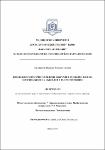I hereby declare that I will use the electronic library contents in compliance with COPYRIGHT AND RELATED RIGHTS ACT, Article 24, paragraph 1, item 9, only for scientific, cultural and educational purposes, without commercial gain, without commercial interest and non-profit.No Yes

Some Deontological Considerations Related to Features of Communication with Patients with Acute Intoxication // Някои деонтологични проблеми, свързани с особеностите на комуникацията с пациенти с остри отравяния

Date
2021Author
Yovcheva-Stancheva, Marieta
Йовчева-Станчева, Мариета
marietyovcheva@gmail.com
Metadata
Show full item recordAbstract
Deontological problems are common in clinical toxicology. This is a current socially-significant topic because of the large number of acute poisonings. The aim of the dissertation is to examine the deontological considerations resulting from the specific characteristics of the communication between a doctor and a patient with an acute intoxication. The main problems are in the area of informed consent for or refusal of treatment and consent for disclosing confidential information to relatives. The main reason is impaired and ineffective doctor-patient communication caused by transient toxic cerebral changes. The risk of communication barriers is highest in acute intoxications with alcohol, medicaments, narcotics, and solvents. Three groups of risks factors are identified: A. Directly related to the intoxication: high incidence of altered mental status; transience and dynamic of the cerebrotoxic syndrome; difficult obtaining of valid informed consent, necessity for coercion in some cases. B. Related to the patients, indirectly to the poisoning: comorbidity, psychoemotional, intellectual, social, etc. C. Related to the medics and the current laws and provisions. Approaches for improving the informed decision-making process in toxicology patients, developed by us, are proposed: 1. A form for dynamic assessment of capacity for communication and for informed consent. 2. A method for validation of informed refusal of treatment using a whole-sentence, handwritten statement as a supplement to the official form. 3. Updating clinical toxicology training. В клиничната токсикология нерядко се срещат деонтологични проблеми. Темата е актуална и социално значима поради големия брой остри отравяния. Целта на дисертацията е да се проучат деонтологичните проблеми, произтичащи от специфичните особености в комуникацията лекар-пациент с остра интоксикация. Установяваме, че основните проблеми са в областта на информираните решения за лечение – съгласие или отказ и разкриването на лекарска тайна пред близките. Основната причина е смутената и неефективна комуникация лекар-пациент поради преходни токсични церебрални промени. Най-висок риск от комуникационни бариери има при отравяния с алкохоли, медикаменти, наркотици и разтворители. Идентифицират се три групи рискови фактори: А. Пряко свързани с отравянето: висока честота на токсично променено съзнание; преходност и динамика на церебротоксичния синдром; трудно получаване на валидно информирано съгласие, необходимост от принуда в някои случаи. Б. Свързани с пациентите, непряко с отравянето: коморбидност, психоемоционални, интелектуални, социални, семейни и други. В. Свързани с медиците и актуалните закони и разпоредби. За подобряване качеството на процеса на информираните решения при токсикологични пациенти предлагаме: 1. Разработен от нас формуляр за динамична оценка на способността за комуникация и информирани решения. 2. Разработена и изпитана от нас форма на информиран отказ от лечение със собственоръчно написано изречение, като допълнение към официалния формуляр. 3. Актуализиране обучението по клинична токсикология.
